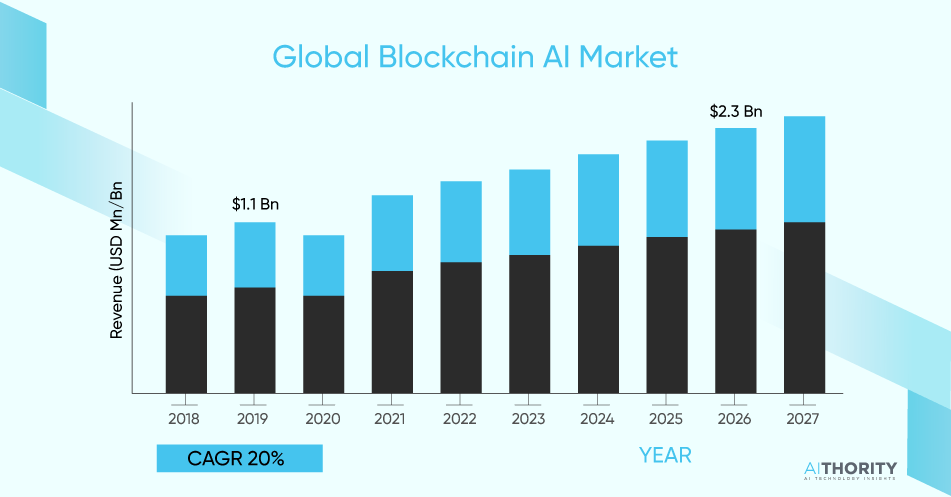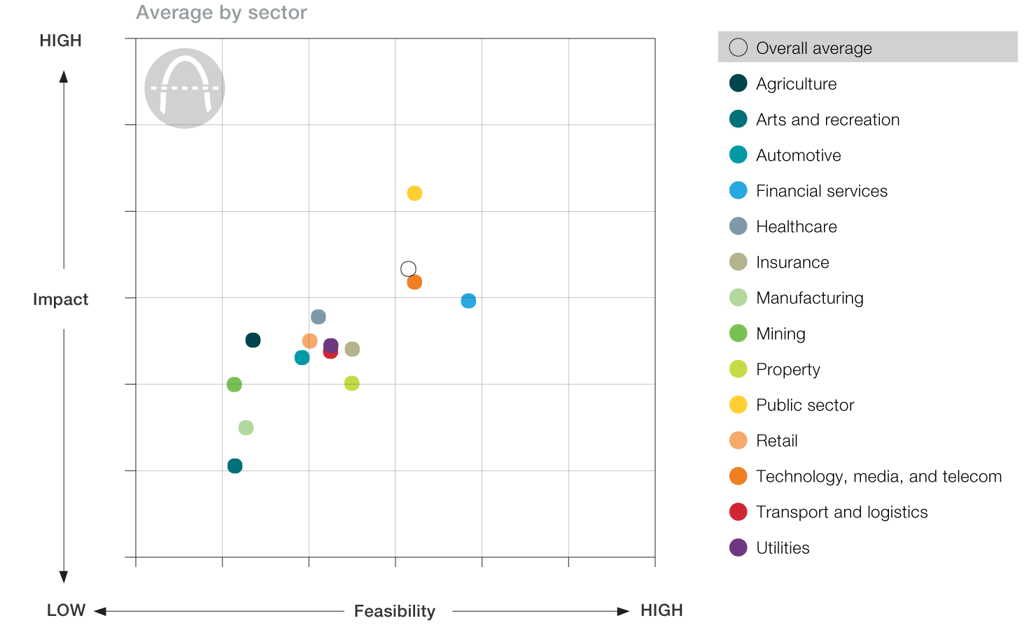AI In Blockchain: Applications of Artificial Intelligence with Blockchain Technology
Thanks to blockchain and AI, the whole financial sector had the radical transformation.
What do you think would happen if you took the finest features of each?
The intersection of AI and Blockchain is changing the face of the financial services industry, and it’s not simply a fad. Learning the fusion is useful for expatriates all over the world for the same reasons that it is useful for locals.
Read: AI In Cryptocurrency
Introduction
By making machines smarter than humans, AI is changing whole markets. The use of AI is changing the way companies operate, particularly in the areas of machine learning and natural language processing. With more and more businesses embracing AI solutions for automation, predictive analysis, and tailored customer experiences, the market for AI-based solutions is projected to witness strong growth in the coming years.
Read this trending article: Role Of AI In Cybersecurity: Protecting Digital Assets From Cybercrime
 Data security and transparency have been transformed by blockchain technology, a distributed ledger that cannot be altered. The design’s initial focus was on cryptocurrency, but it has since found use in a wide range of sectors, such as healthcare, supply chain management, and banking. The adoption of Blockchain in these areas is driving the market size since it provides safe, transparent, and traceable transactions. Blockchain technology has emerged as an essential component of the digital revolution. Artificial intelligence (AI) and blockchain technology work together to solve problems with data security, transparency, and efficiency.
Data security and transparency have been transformed by blockchain technology, a distributed ledger that cannot be altered. The design’s initial focus was on cryptocurrency, but it has since found use in a wide range of sectors, such as healthcare, supply chain management, and banking. The adoption of Blockchain in these areas is driving the market size since it provides safe, transparent, and traceable transactions. Blockchain technology has emerged as an essential component of the digital revolution. Artificial intelligence (AI) and blockchain technology work together to solve problems with data security, transparency, and efficiency.
The combined market value of AI and blockchain technologies is expected to surpass $703 million by 2025, growing at a CAGR of 25.3% from 2020 to 2025.
The Power of Blockchain: How It Works with AI?
By 2030, PwC estimates that AI will contribute $15.7 trillion to the global economy, leading to a 14% increase in global GDP. By the same year, Gartner predicts that the value blockchain technology adds to businesses will have increased to $3.1 trillion.
A Blockchain is a distributed ledger or database that is stored in several locations over a large network of computers. As a decentralized and secure transaction record, they play a vital function in cryptocurrency systems. You can put them to use for more than just cryptocurrencies. Any sector may utilize blockchain to create unchangeable records. In this sense, “immutable” refers to anything that cannot be changed or modified.
Foreigners living abroad who send money home to their families will benefit greatly from training in Blockchain and AI. Understanding when, when, and how to use Blockchain and AI is made easier with the information provided in this blog. Blockchain became well-recognized due to its use in digital currencies. However, its applications have expanded well beyond the realm of cryptocurrencies and related data. Since its introduction, Blockchain has found applications outside finance, particularly in the sectors of human resources, property registration, and the supply chain, where it is used to store and verify data.
Satoshi Nakamoto is widely recognized for conceptualizing and developing Blockchain technology, the backbone of the first modern cryptocurrency. In 2009, it was released to the general audience. Financial transactions on the blockchain, such as invoicing and payment processing, may be automated by AI to reduce the role of middlemen and increase productivity. Since all participants in the network have access to the same information, the blockchain may also be used to keep tabs on items and guarantee their legitimacy and transparency.
Read: How AI Is Transforming Big Data?
Few AI and Blockchain Projects
Exclusive Commentary
We had exclusive commentary from one of our AiThority guests in his byline from Evan Vandenberg is the Co-Founder and CEO at Dibbs.
So, why is blockchain technology necessary for this move into the future? It provides businesses with a number of benefits, including:
- Increased security and transparency: Businesses can use blockchain to track and verify transactions more accurately thanks to its secure, tamper-proof nature. Additionally, because the blockchain is decentralized, this helps businesses avoid fraud – no one can make any changes or withdrawals without making others aware.
- Reduced costs: Blockchain can help businesses reduce their costs in a number of ways. For example, blockchain can be used to automate payments and settlements. This can save businesses time and money on processing fees. Additionally, blockchain can be used to create new revenue streams, which can help businesses offset their costs.
- New revenue streams: Whether you provide customers with products, services, or experiences, blockchain can open up new business opportunities – more on that below.
Applications of Artificial Intelligence with Blockchain Technology

This graphic representation has been picked up from McKinsey.
- Healthcare
Artificial intelligence (AI) has the potential to improve almost every facet of healthcare, from the presentation of treatment insights and the fulfillment of user demands to the identification of insights from patient data and the revelation of patterns. Blockchain technology allows for the safe sharing of sensitive patient information such as electronic health records across healthcare providers.
- Medical research
The use of blockchain and AI in the pharmaceutical business has the potential to greatly improve the success rate of clinical trials and increase transparency and traceability across the medication supply chain. Clinical trials may achieve greater data integrity, transparency, patient monitoring, consent management, and automation of trial participation and data collecting by combining modern data analysis with a decentralized architecture.
- Financial Services
By facilitating trust, reducing friction in multi-party transactions, and speeding up transaction times, blockchain and AI are revolutionizing the financial services sector. Candidates agree to allow access to their data stored on a distributed ledger.
- Supply Chain
Blockchain technology improves transparency and efficiency in supply chain financing. By documenting every supply chain step on a blockchain, stakeholders can verify product legitimacy, quality, and provenance. This lets lenders lend based on verifiable data, decreasing fraud and enhancing loan availability for SMEs. By analyzing shipping records and market patterns, AI can forecast demand, optimize inventory management, and reduce supply chain risks.
- Customer Service
AI-powered chatbots and virtual assistants improve banking client service. These intelligent systems can answer questions, provide suggestions, and give 24/7 assistance. AI chatbots use natural language processing and machine learning to understand client preferences, predict requirements, and provide customized answers.
- Smart Contracts Optimization
AI-powered tools continuously monitor smart contracts, keeping an eagle eye on transactions. They can instantly detect unauthorized or unusual activities, triggering alerts for immediate action. This real-time monitoring ensures the contract behaves as intended. AI employs predictive analytics to anticipate potential issues before they become problems. By analyzing historical data, AI can foresee contract execution challenges, allowing for preventive measures.
- Identity Verification
Traditional identity verification methods often rely on cumbersome processes, from presenting physical IDs to answering personal questions. However, with the advent of Blockchain technology and the introduction of AI, this paradigm is shifting dramatically.
Benefits Of Incorporating AI Into Robotics
Benefits of AI in Blockchain
- Enhanced Data Management
- Globalized verification systems
- Optimized Energy Consumption
- Innovative audits and compliance systems
- Improved Scalability
- Smarter finance
- Transparent governance
- Augmented Security Measures
- Intelligent retail
- Intelligent predictive analysis
- Digital Intellectual Property Rights
- Innovative Data Management
Challenges
- Technical challenges
- Scalability
- Regulation
- Data privacy
- Interoperability
- Adoption
Trends
- Decentralized AI
- Federated learning
- AI-powered blockchain networks
- AI-based smart contracts
- AI-based digital twins
Future
- Enhanced Convergence of AI, Blockchain, and Virtual Reality
- Interoperability and Efficiency
- Growth of Decentralized Finance (DeFi)
- Enterprise Blockchain Adoption
- Rise of Central Bank Digital Currencies (CBDCs)
- Enhanced Blockchain Education
- AI-Enabled Blockchain
- Regulatory and Legal Evolution
FAQ’s: AI And Blockchain
What is BaaS?
Blockchain as a Service, or Baas for short. Blockchain-as-a-service allows businesses to rent blockchain infrastructure in the cloud, following the trend of making technology available on a subscription basis.
Specifically, the service provider will offer, maintain, and host all of the necessary software and hardware for blockchain applications. Any blockchain platform, such as Ethereum, Hyperledger Fabric, Corda, Bitcoin, Chain Core, BlockApps, or Quorum, can be used by the Baas partner to construct the blockchain network.
Can AI build blockchain?
Examples of areas that may be enhanced by using artificial intelligence software include scalability, efficiency, and security on the blockchain. The development of smart contracts and the enhancement of transaction correctness might potentially lead to more secure and rapid automation of procedures.
Can blockchain technology be replaced by AI?
The clock is the only constant here. Since blockchain technology is still evolving at a rapid pace, it is currently impossible to automate its development.
Can Bitcoin be mined using AI?
By refining algorithms, providing in-the-moment data insights, and recommending cutting-edge gear, AI provides ways to boost mining operations. Because AI has the potential to improve crypto mining’s energy efficiency, strategic planning, and sustainability, it may play a crucial part in the industry’s future.
Conclusion
Integrity in data sets is possible thanks to the combination of AI and Blockchain. Because the data is unbreakable, it may be used to tighten security and anticipate intrusions in record time. Two of the most talked-about developments in IT recently have been blockchain and AI. Researchers have been debating and studying the merging of the two technologies despite their very distinct evolving parties and applications.
While AI has many advantages, such as the ability to process massive amounts of data rapidly and mimic human reasoning, it also has several disadvantages, such as the fact that AI choices are not always easy to understand. Immutable and publicly accessible digital records and distributed ledger technology are two of blockchain’s most salient characteristics that might shed light on an artificial intelligence system that is otherwise centralized and difficult to understand. To the degree that these characteristics are practical and desired in the current setting, blockchain has the power to offer AI privacy, accountability, and trust.
Augmentation, automation, and processing power are three more areas where blockchain could enhance AI. The healthcare, life sciences, financial services, and supply chain sectors are just a few that have already begun to explore the potential integration of blockchain technology with artificial intelligence.

Comments are closed.